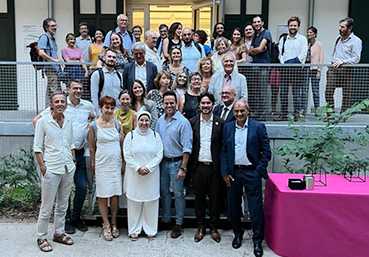Social Economy Europe has asked the Member States to unanimously approve the European Commission’s Recommendation in favour of this business model. This was made clear on 12 September during the session held by the Social Economy Intergroup of the European Parliament in Strasbourg.
EU institutions, governments and Social Economy organisations are working to ensure that this Recommendation is approved within the framework of the Spanish Presidency of the EU and presented at the European Social Economy Conference to be held in San Sebastian on 13 and 14 November.
The president of Social Economy Europe (SEE), Juan Antonio Pedreño, presented the main proposals for improvement to the Intergroup, including the need to strengthen the business and entrepreneurial dimension of the Social Economy.
In this way, he pointed out the importance of “facilitating the construction of ecosystems in the States and integrating the social economy into all their socio-economic policies and stimulating it as a business actor that represents 6% of employment and 8% of GDP in Europe”.
The president of the European social economy employers’ organisation also pointed out that the Recommendation should “forcefully” support the mechanisms for dialogue and participation in social economy business management and also urge the Member States to incorporate the organisations representing the social economy into the social dialogue mechanisms.
SEE announced a “strong communication campaign” aimed at the Ministers of Labour and Employment of the Member States in order SEE has announced a “strong communication campaign” aimed at the labour and employment ministers of the Member States in order to achieve unanimous approval of the recommendation ahead of the next Council of Ministers of the European Union.
For a rapid adoption of the proposal
During the Intergroup session on 12 September, the Special Commissioner for the Social Economy of the Spanish Ministry of Labour and Social Economy, Víctor Meseguer, also took part, expressing his confidence that the 27 Member States would quickly adopt the European Commission’s Recommendation, a Recommendation that they value positively and are even committed to extending.
The co-president of the Social Economy Intergroup, Patrizia Toia, spoke on behalf of the MEPs. She described the Recommendation as “ambitious” and asked that “these efforts should not be in vain”, and for the Recommendation to be approved under the Spanish Presidency of the Council of the EU, which the Social Economy is one of the priorities.
Claude Gruffat, also co-president of the Intergroup, spoke along the same lines, calling for the model to be strengthened in the European institutions, while the president of CECOP (European Confederation of Industrial and Service Cooperatives) and EESC member, Giuseppe Gerini, warned that the Recommendation does not take too much account of the industrial sphere in which the social economy operates, and therefore insisted on the need to pay attention to this point.
The session included a second round table, entitled “The Recommendation seen from the local level and the Social Economy Ecosystem”. Speakers included Jérome Saddier, Vice-President of SEE and ESS France, Aude Saldana, Secretary General of the Global Social Economy Forum, and Antoine Dubois, Vice-President of the Eurometropolis of Strasbourg in charge of the social economy.
Saddier pointed out that the draft Recommendation is very “exhaustive” and highlighted the complexity of drawing up this document due to the heterogeneity of the model in the different countries. In this sense, he recalled the need to improve the existing legal frameworks, which are already favourable to the development of the social economy. Saldana described the Recommendation as “totally innovative”.







